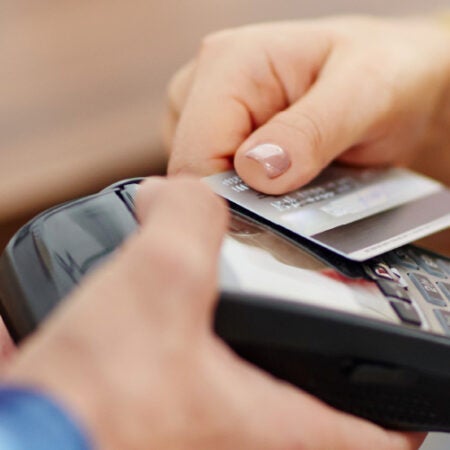
Disclosure regarding our editorial content standards.
It’s a classic piece of advice in the financial world to keep your oldest credit card open to benefit your credit score because it has the longest credit history attached to it. However, you probably don’t use this old credit card as it likely has the least enticing rewards and benefits or the highest interest rate.
Have you ever wondered though, “What happens if I don’t use my credit card?” Does it negatively impact your credit score? Will the card be terminated? In this guide, we answer all the common questions readers have about inactive credit cards.
Is It Bad to Not Use a Credit Card?
Technically speaking, not using a credit card isn’t bad. However, there are pros and cons to stopping all activity on your credit card. The obvious positive is that by not using a credit card, you can’t rack up massive amounts of debt on that card.
On the other hand, if you’re not using your card, you’re likely not checking it either. This means that fraudulent activity could go on for a long time before you catch on. Additionally, an inactive credit card can actually negatively impact your credit score (keep reading to find out how!).
How Does an Unused Credit Card Affect Your Credit Score?
Your unused credit card’s relationship with your credit score can be complicated. An inactive credit card is less important if you have multiple cards that you’re still using, but if you don’t have a lot of cards or are moving away from using plastic completely, be aware of some possible pitfalls.
You Won’t Be Building Credit
If your dormant credit card is your only card, you’re missing out on an opportunity to build a positive credit history. When you have only one credit card, you might want to consider using it occasionally to build up a credit history. Try to make one purchase per month and pay it off to keep showing a responsible payment history.
You Could Change Your Credit Utilization Ratio
A third of your credit score is determined by your credit utilization ratio. This ratio essentially compares how much credit you have access to versus how much you spend. Generally speaking, you want to maintain a credit utilization ratio of 30 percent or less.
If leaving a card unused raises your credit limit and decreases your utilization ratio, an unused card will positively impact your credit score. This is probably most common for someone who has other forms of debt, such as car loans, mortgages or student loans. However, if your card issuer chooses to close the account due to inactivity without telling you, that would hurt your utilization ratio and negatively affect your score.
Let’s say your entire credit available per month is a $10,000 credit line plus a $5,000-limit credit card you don’t use. An emergency occurs, and now you have a balance of $4,000 on your credit line. Well, $4,000 of your $15,000 total available credit is a utilization rate of only 27 percent, so your ratio isn’t problematic.
But, if your credit card were suddenly canceled due to inactivity, you no longer have access to that additional $5,000 in credit. All of a sudden, your credit utilization ratio is sitting at 40 percent ($4,000 on a $10,000 credit line) and your credit score takes a hit as a result. And now that your credit score is lower, it may be challenging to get approved for a new credit card with a $5,000 limit like before.
You Could Rack Up Interest
If you’re going to stop using a credit card, always make sure you pay off your entire balance first. Otherwise, once you stop using the card, you might forget about it and the monthly payments still required. If that happens, your balance will continue to rise as the interest piles up, and your credit score will take a significant dive.
When Will a Lender Close an Account Due to Inactivity?
There’s no exact rule for credit issuers canceling cards because there aren’t any rules that the lenders have to follow. It commonly happens around the one-year mark, although some have reported it taking longer or shorter than a year. Sometimes, a lender will revoke rewards instead of closing the card. If you’ve built up travel points or cashback rewards, this could be extremely disappointing.
If you have an inactive card, try to remind yourself to use it once every four to six months. Additionally, watch out for a notice in the mail. Most lenders issue a warning to an inactive user before closing the account.
Should You Close a Credit Card You Aren’t Using?
Ultimately, this decision needs to be made on a case-by-case basis. Generally speaking, most individuals benefit from simply keeping an inactive card open. Having that card increases your credit limit and credit age, and you might want to take advantage of the card’s benefits even on an infrequent basis.
Additionally, your credit score may stay high, opening the door for other financial rewards and opportunities. And lastly, the credit card might be helpful in financial emergencies. However, if the card isn’t a good fit for you or has fees that don’t seem worth it, closing the unused card might be the best move.
What Can You Do Instead of Closing a Card?
Instead of simply closing your card, try to find a compromise. If the card has no fees (or minimal fees), try to use it every four to six months. Purchase a coffee on the card and pay it off immediately. This lets you maintain a higher credit limit for your utilization ratio, contribute positively to your credit history and keep the card for emergencies.
If you want to stop using the card because it just doesn’t fit your lifestyle, whether that’s due to points and rewards that you’re not using or an interest rate that’s too high, talk to the credit card company. You may be able to switch to another card type that gives you what you need and doesn’t entirely close your account with that lender.
Hopefully, now you understand the (complicated) answer to what happens if you don’t use your credit card. This article is full of general advice, but only you know what works best for you. Take a solid look at your situation and make the choice that will benefit you the most. Always use credit responsibly and avoid credit card debt, and get in touch with our team for more credit tips.





